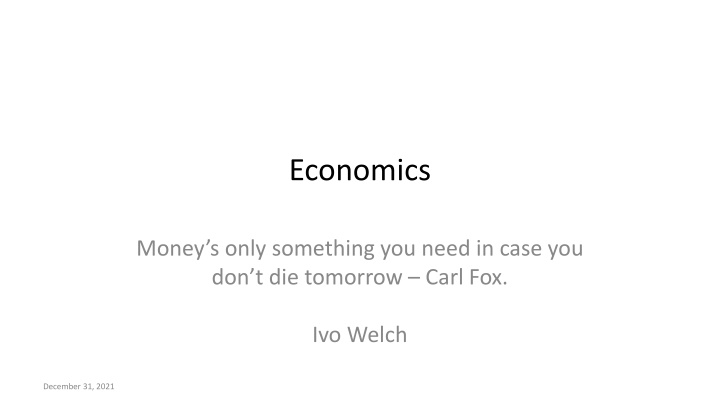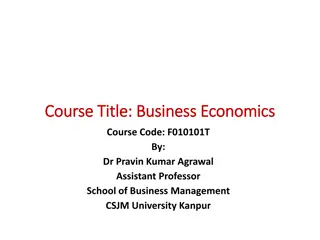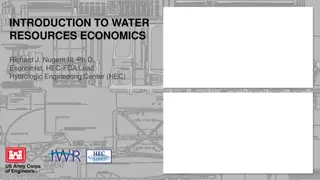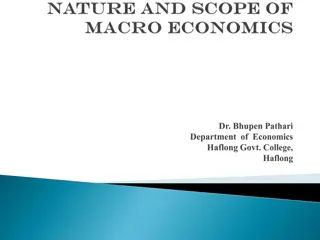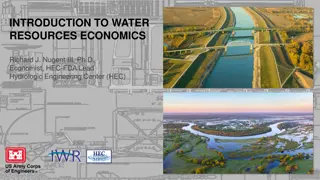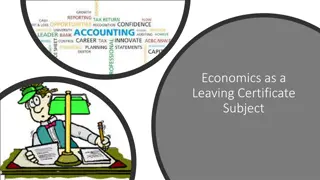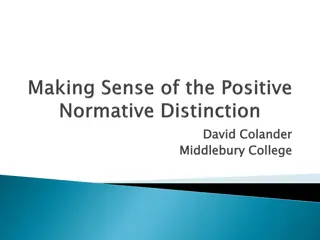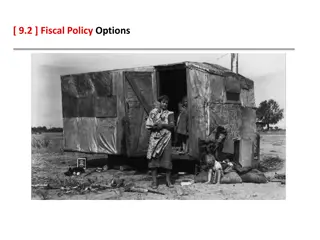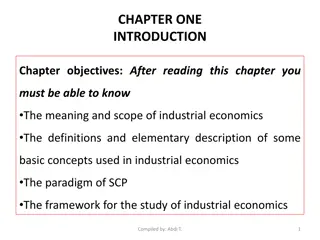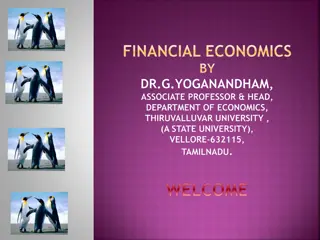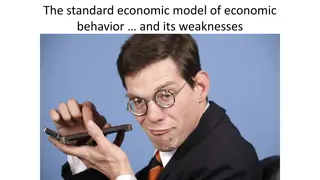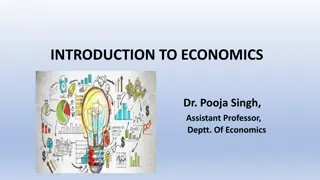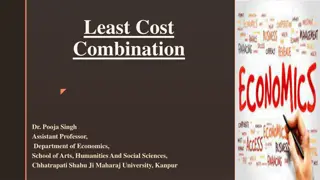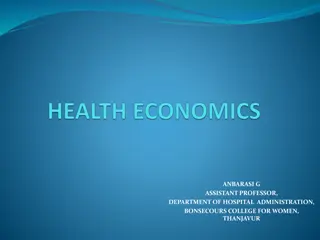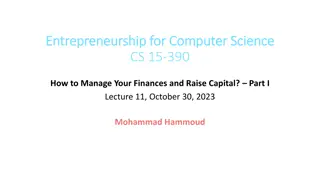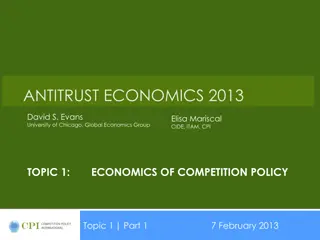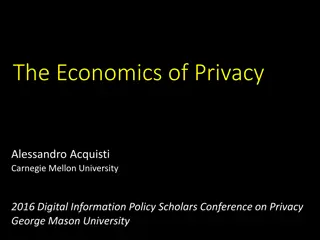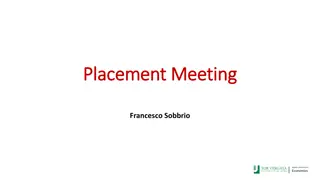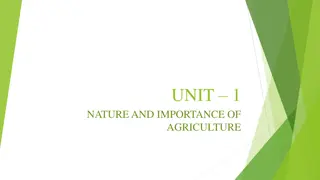Economics
Delve into thought-provoking perspectives on money, self-interest, free-market capitalism, externalities, public goods, and more. Explore the complexities of human nature and economic systems, challenging traditional notions and offering intriguing viewpoints for contemplation.
Download Presentation

Please find below an Image/Link to download the presentation.
The content on the website is provided AS IS for your information and personal use only. It may not be sold, licensed, or shared on other websites without obtaining consent from the author.If you encounter any issues during the download, it is possible that the publisher has removed the file from their server.
You are allowed to download the files provided on this website for personal or commercial use, subject to the condition that they are used lawfully. All files are the property of their respective owners.
The content on the website is provided AS IS for your information and personal use only. It may not be sold, licensed, or shared on other websites without obtaining consent from the author.
E N D
Presentation Transcript
Economics Money s only something you need in case you don t die tomorrow Carl Fox. Ivo Welch December 31, 2021
Self-Interest Economics thinks people act selfishly. Will 8 billion humans change? Become more concerned and altruistic? Become more humane?
Red Pill Evidence: People do act selfishly! There are exceptions to the rule, but overall it s pretty descriptive, especially in large groups. whether you like it or not.
Free-Market Capitalism (Fmc) Don t be dogmatic neither pro nor con! FMC has pulled more people out of poverty than any other invention in world history. FMC is intrinsically not well suited to (emissions) externalities. Do you like government more? (Really? Trump? GOP?) World requires mixed systems, more difficult to balance than extremes.
Externalities FMC is great when there are no externalities. Private cost includes all social costs. FMC is not so great otherwise. Think airplane ticket: No worries for you or airline. Problem are only non-contracting parties; we, who breathe jet fuel and suffer CC.
Public Goods / Externalities Simplest form: Spend $1 to reduce world pollution by $10. Great project!!! Unfortunately, benefits accrue equally to 8 billion people; makes each human better off by $10 / 8 bn. $0.000,000,001,250 per person
You Pay! Go spend your $1! Save the world $10! Yes? No?
Share Expense What if you could share expense with 30,000 Bruins? $0.000,0375 benefit. 3 million Angelinos? $0.003,750 benefit. 30 million Californians? $0.037,500 benefit. 300 million Americans? $0.375 benefit. 1.371 billion OECD? $1.714 benefit.
Free-Riding Assume no coercion. No exclusion. No one really wants to pay themselves. Everyone wants everyone else to pay, just not oneself. If need be: Advocate loudly for laissez faire FMC. Better yet: pretend total disinterest. gone fishing
Realistic Go-It-Alone Cc Fight What if humans benefit equally from global warming? OECD could solo-fund clean projects that reduce negative environmental consequences by at least $5 for every $1 spent. USA and Europe: maybe $20 benefit for every $1. Globally, this is suboptimal (too low). and did we not just state that rich countries will suffer relatively less?
Hobbes Leviathan Social Contract: Police, (Traffic) Laws, Justice; Property Rights (needed for FMC); Defense and Military; Education; Social Services / Medicare / Medicaid; Poverty Reduction; Groundwater preservation and pollution.
Utopian Government Never compare idealized governments to realistic FMC! Plato s original sin.
Politics Old Democrats wanted to engineer society. Identified true real-world ills, but much harder to solve than imagined. Old GOP was intellectually more humble, But never ideal or perfect. Thank the Gods. Politics is never ideal; always messy. Today, parties seem to be polarized capture coalitions.
The Ur Problem: Real-world governments are inefficient, both collecting and spending; suffer lobbies, voters, demagogues, tribes; are deeply conflicted; are run by people like Trump, Sanders, Warren; attract few non-power-hungry panders to public, though some are better and some are worse; make subjects strive less. How about you run for office?
Constant Struggle Unfettered FMC is stupidity. Unfettered government is stupidity. Good balance is a constant struggle: a compromise, without ideal outcomes, but there is no better alternative! Economists Jargon: second-best (more realistic), not first-best. Real-world is often third-best or worse.
Right Questions Reasonable Question: how much government? how much free market? Where are we now? Where should we go? Stupid Blustering Claims: Abolish FMC. Abolish Government. Want effective social, not more social. Too libertarian communities always fail.
Ideal Government How should governments deal with (pollution) externalities? Don t interfere when no externalities; Push against bad externalities; Push for good externalities. Detailed numerical example follows.
Basic Example: 3 Firms, 2 Tech A B C Welfare CL $300 $400 $500 DT $290 $421 $600 $1,321
Dt= Dirty Tech $60 A B C Welfare CL $300 $400 $500 DT $230 $361 $540 $1,240
$20/Externality, Free For All, &Nbsp;&Nbsp;&Nbsp;&Nbsp;&Nbsp;&Nbsp;& Nbsp;&Nbsp; In Equilibrium A B C Welfare CL $260 $380 $480 DT $230 $381 $560 1,201
Benevolent Dictatorship A B C Welfare CL $280 $380 Vrbtn DT Vrbtn Vrbtn $580 $1,240
Green Dictatorship A B C Welfare CL $300 $400 $500 DT Vrbtn Vrbtn Vrbtn $1,200
Pigouvian Tax A B C Welfare CL a(A,B,C) b(A,B,C) c(A,B,C) DT a (A,B,C)-T b (A,B,C)-T c (A,B,C)-T ?
Workings Taxes are not waste! Collected and redistributable to A, B, and C. Tax is all about getting B to do right: A will never pollute anyway. C should always (be allowed to) pollute. B acts in private but should act in social interest. Pigouvian Tax = Externality = $20 + $20 = $40 Assume A and B do not pollute, C does. A and B suffer $20 externality in eqbm.
Pigouvian $40 Tax A B C Welfare CL $280 $380 $500 DT $210 $341 $540 $1,240
Real-World Advantage How to assess private benefit? Presumably better assessed by firms. How to assess social harm? Presumably better assessed by government. Use best of both expertise?
Real-World Problems How much money is wasted in collection? Can lobbies twist and capture it? DC is biggest money train in the history of humanity? Beats Rome and Brussels easily. Want to send more to DC? (To Trump?) Want to send more to Putin? Ping? Kim?
Winners And Losers What is fair ? What is losers can vote?
Perhaps Worst Problem Taxed subjects can move elsewhere! Tiberius: It is the duty of a good shepherd to shear his sheep, not to skin them. Worse here! The sheep still shit on you from over the fence and someone else will be getting the wool!
Economists Vs. Other Boffins The ills and problems of FMC that other boffins are pointing out are very real! But their solutions are often not. Other boffins often imagine ideal governments, which do not exist. Worse, gov growth is often one-way. Economists trust governments less. Economists trust self-interest more.
Change Of Subject Economics of Cost and Scale
Diminishing Returns To Scale (Drs) How to enjoy more hot dogs? How to exterminate cockroaches? 90%? 99%? 100%? How to reduce CO2by driving less?
Drs: Co2Reduction Cheaper in some places than in others: Really cheap on 1 GtCO2; Cheap on 3 GtCO2; Medium on 10 GtCO2; Impossibly expensive at 50 GtCO2. Fix on the margin in cheapest places first! Be content with imperfect solution.
Fixed Vs. Marginal Cost Economics: Marginal vs. Average. The most important concept of economics! E.g., build a $20 billion nuclear plant, then very cheap per extra MWh to generate. High average cost. Near-zero marginal cost.
Sunk Cost Similar to fixed cost, but no longer possible to sell and move assets to other uses. Most investments and finished products become sunk eventually.
(Sunk) Rdd Cost RDD = Research, Development, Deployment. RDD is sunk-cost heavy learn for years, set up labs, etc. Maybe some may be movable education, knowledge, some lab equipment
Rdd Yikes Incidentally, RDD success is often serendipitous often low chance of success, but high upside, with all of us usually benefitting. It s why humanity no longer lives in caves.
Economies Of Scale Opposite of diminishing returns to scale: Factories, specialization, and automation. Industrial Revolution! Power Plants FOAK (first of a kind); NOAK (next of a kind); Iterative improvements; Mass Production.
Economics Of Delay Build now or build next year? Install Solar Now or Wait 1 Year? It will likely be 5-10% cheaper, but it could be more or less. Install batteries now or wait until cheaper? They will likely be 2-5% cheaper, but it could be more or less.
Optimization Problem 1. Install Now , or 2. Delay, Research and Develop? What if learn only if built? These are tough decision problems, but only if your money is on the line, and not the ratepayer s (see lobbies).
Economics Of Innovation Innovation is public good for humanity. Socially, we underinvest in innovation, Really bad if RDD has high fixed cost: Who would undertake it? What if copying and improving is easy? Knowing whether it can work is often biggest problem.
Patent Protection How long should patent protection last? Ex-ante needed to entice innovators, Ex-post undesirable by common good. System expensive and inefficient: Except for lawyers. Similar products often escape protection. What if inventions would have come about anyway? and all patents do is stymie innovation?
Patent Protection Patent may cost $1 million to declare in most world jurisdictions. What about China? IP Theft galore! Attract attention? Will patenting prevent or induce copying? Processes often not patented.
Conclusion This chapter laid groundwork to translate climate change problems and solutions into economic terms.
